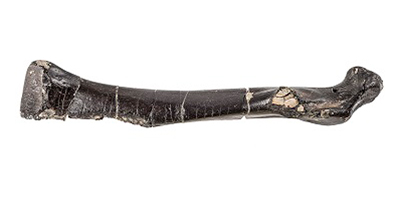A collarbone buried in a slab of rock in Vancouver Island, Canada, turned out to be a fossilized remain of a new flightless bird species from 25 million years ago.
Paleontologists, including Junya Watanabe of Kyoto University (graduate student supervised by Prof. Hiroshige Matsuoka), identified the fossil as a new species of the family Plotopteridae. This was the first time a plotopterid fossil was found in Canada.
Bird bones are typically hollow and fragile, and consequently their fossils generally fail to endure years of damage from crushing and erosion. This specimen, however, was well preserved due to the fact that the bone itself was relatively thick-walled, and preserved rapidly in sandstone.
Plotopterids have previously been found in Japan and the United States, but most of these were giants, some approaching two meters in height. This one was much smaller -- probably about the size of a cormorant -- and the researchers believe it was a diving bird like a penguin that used its wings to propel itself through water.
Watanabe, who studies fossils of flightless birds, contributed to the research with information about anatomical details of plotopterid fossils, and also translated Japanese publications about the bird family into English.
Watanabe and colleagues Gary Kaiser and Marji Johns from the Royal BC Museum in Vancouver named the bird Stemtec suntokum, "long-necked waterbird", from the language of the T'Sou–ke First Nation people.
The finding, says Watanabe, will be particularly useful in understanding the distribution and evolutionary history of Plotopteridae. "Many plotopterid fossils have been found in Japan, but they haven't been analyzed as rigorously as in other places such as North America," he elaborates. "I'm looking forward to understanding more about these birds."
Watanabe presented the findings at the regular meeting of the Palaeontological Society of Japan on 30 January 2016, including insights about the paleobiogeographical significance of Stemtec suntokum.
The fossil is currently in the Royal BC Museum's fossil collections.

Rare penguin-like fossil identified in British Columbia - KYOTO UNIVERSITY



